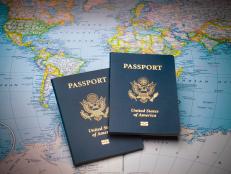20 Etiquette Mistakes You Don't Want to Make When You Travel
Travel Channel shares a few examples of how varied local customs can be and recommends you employ these country-specific etiquette tips when you travel.

Related To:

Photo By: Visit London
Photo By: Steve Larese
Photo By: Steve Larese
Photo By: Steve Larese
Photo By: Steve Larese
Photo By: Visit Japan
Photo By: Steve Larese
Photo By: Steve Larese
Photo By: Steve Larese
Photo By: Bulgaria Travel
Photo By: Steve Larese
Photo By: Paris Convention and Visitors Bureau
Photo By: Steve Larese
Photo By: India Ministry of Tourism
Photo By: Steve Larese
Photo By: Steve Larese
Photo By: Visit Ireland
Photo By: Steve Larese
Photo By: Steve Larese
Photo By: Steve Larese
Go With the Flow
When riding buses in London, always get on at the front of the bus and exit from the back.
Stand on the Right, Pass on the Left
Even though motorists drive on the left in the United Kingdom, pedestrians should walk on the right side of the sidewalk and other thoroughfares just as in the United States. When on an escalator, stand on the right and pass on the left. In Tokyo, people usually stand on the left and pass on the right, though in the past few years there has been a campaign urging people to not pass and maintain one step between the person in front to avoid injuries.
Mind Your Hands in Greece
In Greece, showing your palm with fingers extended is an insult called the mountza. Its origins stem from placing curses on people in ancient times, and later smearing charcoal on the face of prisoners for public humiliation. Avoid using this gesture to signify the number five, to wave to someone or to get someone's attention in Greece.
Say It With (An Odd Number Of) Flowers in Russia
Giving your host a bouquet of flowers in Russia is appreciated--but make sure it's an odd number of flowers. Even numbers of flowers in bouquets are only used in funerals. Also, avoid yellow flowers as they are also associated with funerals. Never shake hands in a doorway or over a threshold, it will offend the house spirit and is bad luck.
Not OK...
In Brazil, the OK sign is akin to giving the middle finger. Locals will probably understand you mean that something is good or fine, but it’s best to avoid here if only for its initial shock value.
Take A Seat When You Eat
In most situations, it's considered rude to walk and eat in Japan. After receiving your food from a yatai cart vendor, move to a comfortable area such as a bench and enjoy your meal there. Walking while eating shows disrespect for the meal and the person who made it for you. Exceptions include festivals and theme parks; when in doubt pay attention to what the locals are doing. Don't eat on public transportation, with the exception of long-distance trains.
Don't Bare Your Soles In Thailand
In Thailand and many other Asian nations, showing the bottom of your feet or allowing them to be seen is insulting. Do your best to keep your feet folded under you or firmly planted on the ground, and avoid crossing your legs lest the sole of your shoe be seen. Also, never touch anyone’s head as it’s considered sacred and sensitive.
Stay in Your Lane in Germany
Don't jaywalk or otherwise ignore pedestrian rules in Germany or your fellow pedestrians could chastise you for breaking the rules. To a less embarrassing degree, you may also get hit by a car or trolley.
Don't Get Tired in The Netherlands
It's easy to be distracted in beautiful Amsterdam (or any city with designated bike lanes), but be sure not to step into the bike lanes here which are as busy as any roadway, even if they are open when the sidewalk is shoulder to shoulder. Short of getting hurt you'll be that tourist who causes a 20-bike pileup.
Bulgaria is Beautiful, yes? No? Yes?
In Bulgaria, nodding one’s head up and down means no, and shaking it side to side means yes. While most Bulgarians understand this is the opposite of most other countries and know when they are speaking with a visitor, it’s best to be completely sure that you both understand your answers here.
Avoid a Cuban Crisis
Avoid calling papaya papaya in Cuba, as papaya colloquially refers to something else here and you could wind up offending or (more likely) getting snickers from the locals. Instead, fruta bomba is used in much of Cuba when refering to this popular fruit.
Greet the Shop Keep in France
Whereas in the United States it's usually the shopkeep who greets customers, in France it is expected that customers offer a polite "bonjour" or "bonsoir" to clerks before looking around.
Avoid a Sticky Situation in Singapore
The city nation of Singapore is famously clean, and the authorities here are devoted to keeping it that way. Getting caught chewing gum here can result in a fine of several hundred dollars, and bringing it into Singapore can result in jail time. It's best to leave it on the plane.
Take a Stand in India
In India, it is frowned upon for a man to take a bus seat next to a woman that he doesn't know. Other passengers may even scold you if you do. If you see an empty seat next to a woman on a bus and men standing, do the same.
Let Me See Your Hands In South Korea
In South Korea, it is extremely rude to put your hands in your pockets, especially when interacting with others. Keep your hands visible at all times when in public.
Take a Bath in Japan
Onsen etiquette is taken very seriously in Japan, but top of the list is to make sure to take a thorough bath before entering the hot spring. And don't worry, others will probably be looking to make sure you take a good long bath, too. Make sure to soap up and rinse completely, and definitely wash your hair, even if you don't plan on getting it wet (hair shouldn't be submerged in a public bath). Locals have been known to send visitors back to the bath if they don't think they've done a good enough job the first time. Have tattoos? Make sure the onsen permits tattoos; many onsens don't allow tattoos to be displayed in public.
Going My Way in Ireland?
Asking for a ride in the Republic of Ireland or Northern Ireland will elicite a chuckle or a slap across the face. If you'd like someone to drive you somewhere, ask for a lift. Also, be sure you know if you're in the Republic of Ireland or the United Kingdom near the border, and use the appropriate pounds or euros. Never joke about the two, either.
Not So Good...
The thumb's up gesture can be interpreted as obscene in Australia, Greece, Russia and throughout the Middle East, though locals know the difference between an insult and gesture of approval via context. It's best to learn how to say "good" in the local language and avoid hand gestures.
Hold That Wish in Europe...
In some countries--including Russia, Germany, Switzerland and Italy--wishing someone a happy birthday before their actual birthday is considered bad luck. It's a superstition, but one that's crossed over into social etiquette and could make people uncomfortable, even if they laugh off the early wish.
Mama Said Don't Point
In many countries summoning someone by curling your index finger toward someone or pointing is considered rude if not highly offensive, especially in the Philippines, Singapore and Japan. To ask someone to come to you, hold your palm down and curl all fingers under it repeatedly. This gesture is commonly seen throughout Europe as well. Pointing, even at inanimate objects, can be considered rude. It is safe, however, to respectfully gesture and nod toward something to which you’d like to bring attention, such as an item in a shop. In Vietnam, never cross your fingers as this is considered vulgar.






